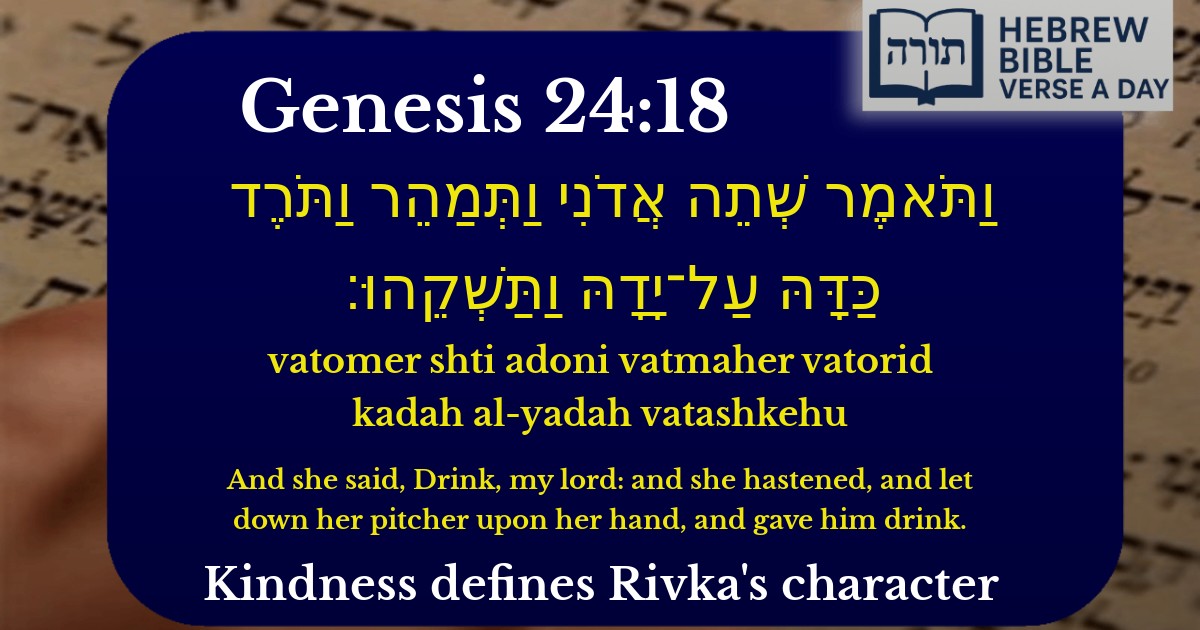Join Our Newsletter To Be Informed When New Videos Are Posted
Join the thousands of fellow Studends who rely on our videos to learn how to read the bible in Hebrew for free!
Hebrew Text
וַתֹּאמֶר שְׁתֵה אֲדֹנִי וַתְּמַהֵר וַתֹּרֶד כַּדָּהּ עַל־יָדָהּ וַתַּשְׁקֵהוּ׃
English Translation
And she said, Drink, my lord: and she hastened, and let down her pitcher upon her hand, and gave him drink.
Transliteration
Vatomer shti adoni vatmaher vatorid kadah al-yadah vatashkehu
Hebrew Leining Text
וַתֹּ֖אמֶר שְׁתֵ֣ה אֲדֹנִ֑י וַתְּמַהֵ֗ר וַתֹּ֧רֶד כַּדָּ֛הּ עַל־יָדָ֖הּ וַתַּשְׁקֵֽהוּ׃
וַתֹּ֖אמֶר שְׁתֵ֣ה אֲדֹנִ֑י וַתְּמַהֵ֗ר וַתֹּ֧רֶד כַּדָּ֛הּ עַל־יָדָ֖הּ וַתַּשְׁקֵֽהוּ׃
🎵 Listen to leining
Parasha Commentary
📚 Talmud Citations
This verse is quoted in the Talmud.
📖 Chullin 95b
The verse is referenced in a discussion about the actions of Rebecca and the significance of her hospitality towards Abraham's servant.


Context of the Verse
This verse (Genesis 24:18) describes Rivka (Rebecca) offering water to Eliezer, Avraham's servant, at the well. This act of kindness is part of the narrative leading to her marriage to Yitzchak (Isaac). The verse highlights her exceptional middos (character traits), particularly chesed (lovingkindness), which is central to the story.
Rashi's Commentary
Rashi (Genesis 24:18) emphasizes Rivka's haste in performing this act of kindness, noting that the phrase "וַתְּמַהֵר" ("and she hastened") demonstrates her eagerness to fulfill the mitzvah of hachnasas orchim (hospitality). He explains that she lowered the pitcher "עַל־יָדָהּ" ("upon her hand") to make it easier for Eliezer to drink, showing her thoughtfulness and consideration for his comfort.
Midrashic Insights
The Midrash (Bereishis Rabbah 60:5) elaborates on Rivka's actions, comparing her kindness to that of Avraham, who also excelled in hospitality. The Midrash notes that her willingness to draw water not only for Eliezer but also for his camels (as described in subsequent verses) was a sign of her suitability to join Avraham's household, which was known for its chesed.
Rambam's Perspective
While Rambam (Maimonides) does not comment directly on this verse, his teachings in Hilchos De'os (Laws of Ethical Conduct) underscore the importance of acting with alacrity in performing kindness, as Rivka does here. He writes that one should strive to emulate the ways of the righteous, who are quick to do good deeds (Hilchos De'os 1:5-6).
Symbolism and Deeper Meaning